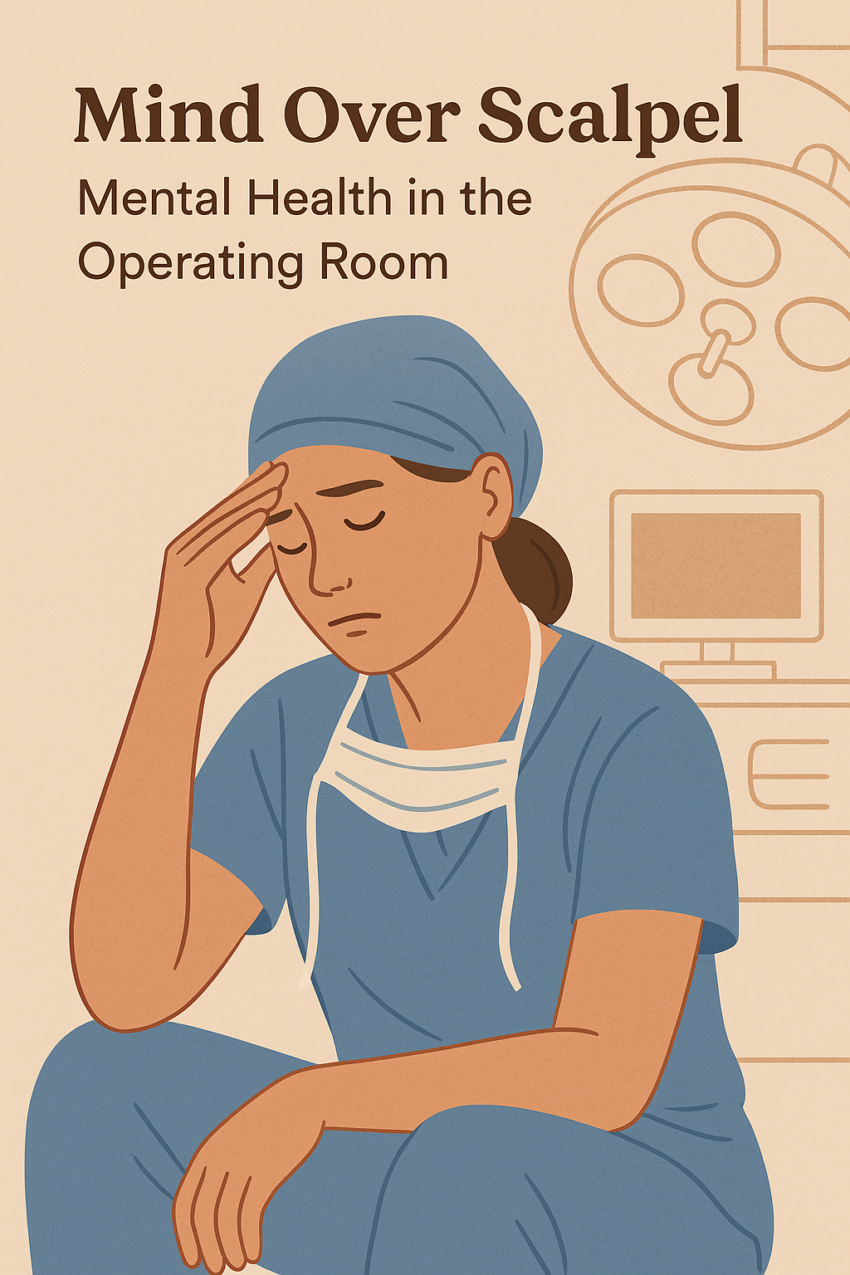Table of Contents
The Silent Struggles of OR Nurses
Being an operating room nurse is not just physically demanding—it’s mentally and emotionally intense. Every day, we navigate high-stakes situations, make split-second decisions, and carry the emotional weight of life-or-death moments. Yet, the conversation about mental health for operating room nurses often takes a backseat.
It’s time to change that. This blog dives into the reality of OR nursing beyond the scrubs and surgical masks—the mental challenges, the unspoken stress, and the strategies to protect our well-being. Because behind every successful surgery is a nurse who deserves mental resilience just as much as technical skill.
Mental Health Challenges in the OR
Working in the operating room means constant stress. There are long shifts, unexpected emergencies, and the pressure of precision. Here are a few common mental health struggles OR nurses face:
1. Burnout: The Hidden Epidemic
It starts subtly—feeling exhausted, dreading your next shift, or questioning whether you can keep going. Burnout creeps in over time, fueled by the emotional intensity of surgeries, demanding schedules, and little time for recovery.
Burnout in operating room nurses often shows up as:
✅ Emotional exhaustion—Feeling drained before your shift even begins.
✅ Reduced performance—Struggling to concentrate or making small mistakes.
✅ Detachment—Becoming emotionally numb to patient outcomes.
2. High-Stakes Anxiety
The OR is unforgiving. Every decision matters, every second counts. This pressure can cause high-stakes anxiety, leaving nurses feeling overwhelmed, even in routine procedures. The fear of making mistakes, handling unpredictable complications, or managing tense surgeon dynamics can be mentally exhausting.
3. Emotional Load: Carrying More Than Medical Responsibilities
Patients come and go, but their stories stick. The emotional toll of seeing life-changing moments—both triumphs and tragedies—can be heavy. OR nurses often experience secondary trauma, absorbing the grief, fear, and uncertainty of patients and families.
4. The Culture of Toughness
In many operating rooms, there’s an unspoken rule: “Toughen up, push through, don’t show weakness.” While resilience is crucial, this mindset discourages nurses from acknowledging their mental struggles, leading to suppressed emotions and long-term stress.
Mind Over Scalpel: Mental Health Strategies for OR Nurses
So, how do we protect our mental health in such an intense environment? Here are practical strategies to stay grounded, resilient, and emotionally balanced:
1. Acknowledging Stress is Not a Weakness
One of the biggest hurdles in improving mental health for operating room nurses is accepting that stress and burnout are real—and needing support doesn’t mean incompetence. Building emotional resilience starts with self-awareness.
🔹 Quick check-in: How do you feel before and after your shift? If exhaustion, anxiety, or frustration dominate, it’s time to prioritize mental recovery.
2. Micro-Breaks: Small Habits, Big Impact
OR nurses often don’t get long breaks, but even 60 seconds of mental reset can help.
✔ Pause between procedures:Close your eyes, take deep breaths, reset your mind.
✔ Stretch & move: Loosen up tension in your shoulders and neck.
✔ Use sensory grounding: Feel the temperature of a cup of tea, focus on a calming scent.
3. Building Emotional Resilience
Emotional resilience is not about ignoring stress—it’s about handling it in a healthier way.
🟢 Reframe negative thoughts: Instead of “I can’t handle this,” try “I’ve been in tough situations before, and I got through them.”
🟢 Practice gratitude: At the end of the day, acknowledge one moment where you made a difference. 🟢 Detach from the weight of every case: While compassion is vital, carrying every emotional burden leads to burnout. Learn to process, but not absorb.
4. Stronger Nurse-Surgeon Communication
The OR team dynamic plays a huge role in mental health for operating room nurses. Poor communication increases tension, making stressful situations worse. Nurses should feel empowered to voice concerns, seek support, and foster teamwork.
🔹 When tensions rise: Stay clear, direct, and professional—avoid emotional responses to surgeon frustration.
🔹 De-escalate fast: If an interaction becomes confrontational, take a mental step back before responding.
🔹 Find allies:Strengthen relationships with fellow nurses and anesthesiologists who can provide support.
5. Post-Shift Decompression Rituals
Mental recovery doesn’t start when you have days off—it starts after every shift. Simple decompression habits can help process stress before it builds up.
🛑 Don’t take OR stress home with you:
✔ Journal: Write down one challenge and how you handled it.
✔ Decompress before leaving: Take five deep breaths before stepping out of the hospital.
✔ Transition mentally: Change environments—walk outside, listen to music, or engage in a non-medical hobby.
Moving Forward: Long-Term Mental Wellness for OR Nurses
Mental health for operating room nurses is not just about coping—it’s about thriving. It’s about ensuring that the same care we provide for patients extends to ourselves.
✅ Advocate for healthier work culture: Speak openly about mental health in your team.
✅ Seek mentorship & peer support: A strong nursing network is invaluable for emotional resilience. ✅ Explore therapy or professional support:Just like physical health, mental health deserves professional attention when needed.
As OR nurses, we manage critical situations every day. But resilience isn’t just about surviving shifts—it’s about sustaining the passion and purpose behind the work we do. Because even in high-stakes surgery, mind over scalpel matters.
If you’re an operating room nurse, know this: Prioritizing mental health is not a luxury—it’s a necessity. The more we support each other, the stronger and healthier our profession becomes.
What are your go-to strategies for handling stress in the OR? Drop a comment below—I’d love to hear your thoughts! 💙
Internal Links
- Navigating the Operating Room: A Nurse’s Perspective – A great resource for understanding the challenges and dynamics of working in the OR.
- Burnout Recovery for Nurses: Strategies for Resilience – Since mental health is a key focus, linking to burnout recovery strategies will provide additional support.
External Links
